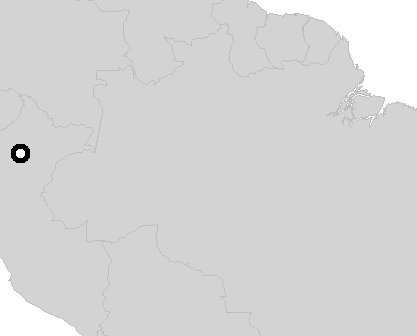
| www.CuriousTaxonomy.net |
|
The Flood in World Myth and Folklore
Amazon Basin |
| © 2021 Mark Isaak |

They say we are descended from just one person. . . .
Some people went fishing with huaca (a poison made from Clibadium remotiflorum), but there were no fish in the lagoon. Our God, Kuánra, sent his son, Kuánra Kájlaui, who began spearing fish. Evil people saw him catching the fish, and they dug a hole and buried him. But there were good people nearby who dug him from the hole and cleaned him off.
To thank them, Kuánra Kájlaui speared some tiny fish, which he filled with water and turned into doradas (Elisha deauratus), doncella (unidentified), tucanaré (Cichla ocellaris), and other large fish (which is why there are large fish in the lagoon today). "Quickly go and cook these fish," he told the good people. "My father is going to avenge me and send a tremendous storm. Hurry and cook and eat the fish."
One of the good men told his family to quickly cook the fish, and then they ate them. Then he was told to climb a cudí tree (Erythrina elei). The family climbed to a high branch, but the man's pregnant wife was turned into a termite nest and remained stuck halfway up. Then the rains came, and it became dark as night. The evil people were all drowned. Those in the tree, by feeling around in the dark, found a variety of foods and so survived for more than a month while the flood remained. They dropped the tree's fruits to test by the sound of their falling whether the flood had receded yet.
Gradually, the waters lowered and the light increased. The man sent his son down to see if the land was drying. The son yelled, "Yes, the flood is receding," and he was transformed into a white heron (Egretta alba). His other son, upon being sent down, turned into another bird, a coro coro (Caracara plancus) and flew off. Then the father himself had to climb down.
There was no forest or overgrowth left, just a giant beach. The man walked along it for some time and came to a small shelter stocked with all sorts of foods. Curious who had prepared it, he dug a hole in the beach, hid in it, and waited.
A small, wonderfully crafted canoe came down from the sky. In the stern was Kana Nebá, "our goddess." Next to her was a woman wearing a garment of palm-fiber cloth. In the bow was a servant woman who did not know how to weave such cloth. In fact, she could do nothing; she was worthless.
The man came out of hiding and grabbed the servant woman. She rebuffed him, saying, "Take the other woman, wrapped in palm-fiber cloth. It is she who Kana Nebá sent to be your wife," but the man kept hold of her. A pit viper (Bothrops pictus), a spider, and a large ant (Myrmica saevissima) were sent to bite him, but still he grasped the servant woman.
"Kana Nebá sent me to be your servant, but you are determined to take me and not the other woman who knows how to do everything. So be it." From that time on there have always been ignorant, useless people who do not even know how to make palm-fiber cloth. As Kana Nebá left, the wise woman turned into a bird and flew off. The other woman stayed and married the man.
The man's new wife told him that they should have children without sex, but just by embracing. While the man was away hunting, the woman rolled up a ball of cotton. When the man returned, it was a child, and it greeted the man as its father. The man wondered how it was made, so next time he stayed near, hid, and watched. When he saw the woman create a child from cotton and place it in a hole, he came out of hiding and said, "That is not my child." The child began crying.
The woman explained that those who do not abstain from sex for ten months make their children sick. But the man had sex anyway, and the child became ill. That is why we abstain from sex for ten months after birth, lest the children become ill or lame.
Bartholomew Dean, "The Poetics of Creation: Urarina Cosmogony and Historical Consciousness", Latin American Indian Literatures Journal 10: 22-45 [25-28].
